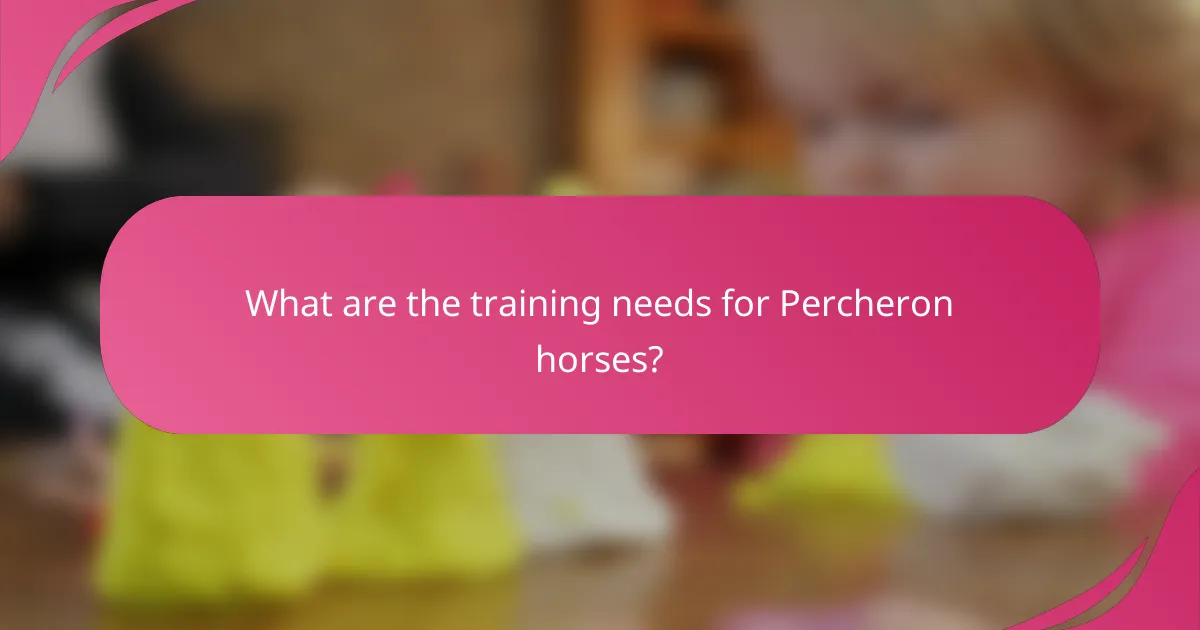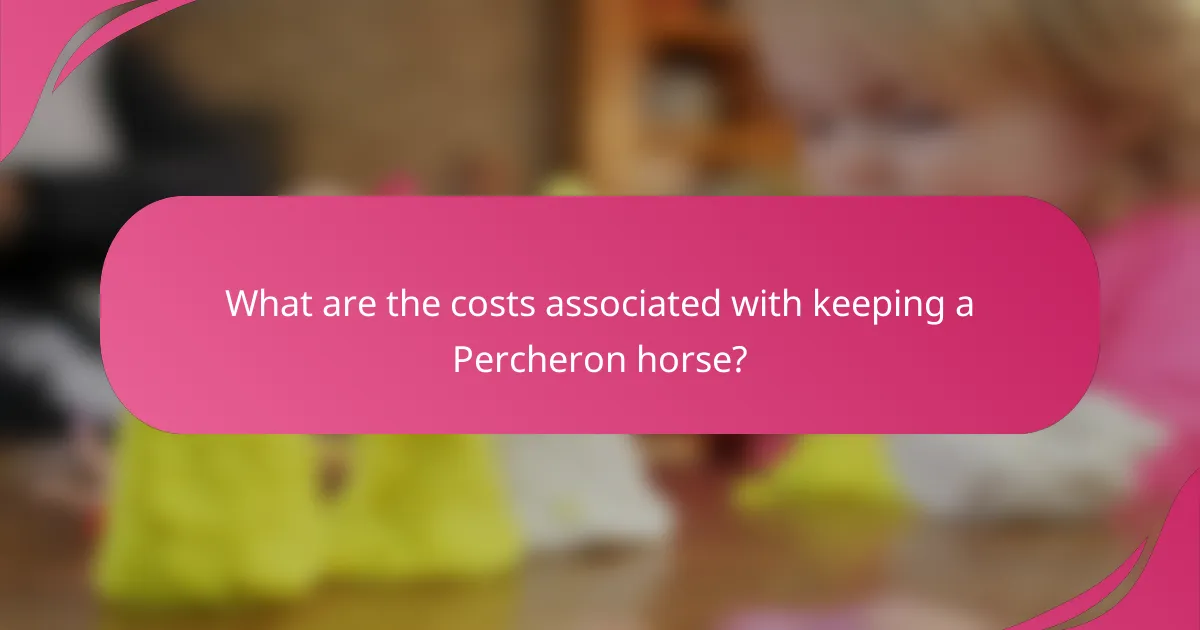Percheron horses thrive in environments that offer ample space, including a suitable stable and sufficient pasture for movement and socialization. Proper care, encompassing nutrition, grooming, and health maintenance, is crucial for their well-being and performance. Additionally, consistent training is essential to develop their skills and foster a trusting relationship between horse and handler.

What are the space requirements for Percheron horses in the UK?
Percheron horses require ample space for their well-being, including a suitable stable and adequate pasture. In the UK, it is essential to provide these horses with enough room to move freely, socialize, and graze comfortably.
Minimum stable size
The minimum stable size for a single Percheron horse should be around 12 feet by 12 feet (approximately 3.6 meters by 3.6 meters). However, larger stables, such as 12 feet by 14 feet (3.6 meters by 4.3 meters), are preferable to ensure the horse has enough space to lie down and move around without restriction.
When planning stable space, consider including a separate area for grooming and feeding. This additional space can help maintain cleanliness and organization within the stable environment.
Pasture space recommendations
For pasture, a minimum of 1.5 to 2 acres (0.6 to 0.8 hectares) per Percheron horse is recommended to allow for adequate grazing and exercise. This space helps prevent overgrazing and ensures that the horse has access to fresh grass and forage throughout the year.
Additionally, rotating pastures can help maintain the quality of the grazing land and promote healthy grass growth. This practice can be beneficial in managing the horse’s diet and overall health.
Socialization space needs
Percheron horses are social animals and thrive in environments where they can interact with other horses. Providing a communal space or paddock where they can socialize is crucial for their mental well-being. A space of at least 0.5 acres (0.2 hectares) shared among several horses can facilitate healthy interactions.
Ensure that the socialization area is safe and free from hazards. Regularly check fencing and remove any dangerous objects to create a secure environment for the horses to bond and play.

How to care for Percheron horses effectively?
Caring for Percheron horses involves meeting their specific needs in feeding, grooming, and health maintenance. Proper care ensures their well-being and performance, making it essential to follow established guidelines.
Daily feeding guidelines
Percheron horses typically require a diet rich in nutrients to support their size and energy levels. A daily intake of around 2-3% of their body weight in hay and grains is recommended, with a focus on high-quality forage.
It’s important to provide fresh water at all times and consider supplements for vitamins and minerals, especially if the horse is working hard. Regular feeding times help maintain their digestive health.
Grooming routines
Regular grooming is crucial for the health of a Percheron, as it helps to remove dirt, debris, and loose hair. Aim to groom your horse at least once a day, using a curry comb followed by a stiff brush to clean the coat.
Pay special attention to their hooves, cleaning them daily and checking for any signs of injury or infection. Additionally, regular mane and tail care will prevent tangles and promote a healthy appearance.
Health check frequency
Routine health checks for Percherons should occur at least once a month, focusing on dental care, hoof health, and overall condition. Annual veterinary visits are essential for vaccinations and deworming.
Monitor for signs of illness or discomfort regularly, as early detection can prevent more serious health issues. Keeping a health log can help track vaccinations and any changes in behavior or condition.

What are the training needs for Percheron horses?
Percheron horses require consistent training to develop their skills and maintain their health. Effective training focuses on building trust, establishing routines, and addressing specific behavioral traits unique to this breed.
Basic training techniques
Basic training for Percheron horses should include groundwork, lunging, and riding exercises. Groundwork helps establish respect and communication, while lunging allows the horse to develop balance and responsiveness. Positive reinforcement, such as treats or praise, can enhance learning and encourage desired behaviors.
Using clear cues and maintaining a calm demeanor are essential. Consistency in commands and routines will help the horse understand expectations and build confidence.
Recommended training duration
Training sessions for Percheron horses should ideally last between 30 to 60 minutes, depending on the horse’s age, fitness level, and experience. Young or inexperienced horses may benefit from shorter sessions, while more seasoned horses can handle longer durations. Regular training, ideally several times a week, helps reinforce skills and maintain fitness.
It’s important to monitor the horse’s response during training; if signs of fatigue or stress appear, consider shortening the session or taking breaks to ensure a positive experience.
Common training challenges
Percherons can be strong-willed and sometimes stubborn, which may lead to challenges during training. Establishing a clear leadership role is crucial to overcoming resistance. Patience and persistence are key, as building trust takes time.
Additionally, some Percherons may have a tendency to become distracted. Training in a quiet environment initially can help minimize distractions, gradually introducing more stimulating settings as the horse becomes more focused and responsive.

What are the costs associated with keeping a Percheron horse?
The costs of keeping a Percheron horse can vary significantly based on factors like location, care level, and training needs. Generally, prospective owners should budget for initial purchase prices, ongoing care expenses, and training costs to ensure proper management of their horse.
Initial purchase price
The initial purchase price of a Percheron horse typically ranges from several thousand to over ten thousand USD, depending on factors such as age, training, and bloodlines. Young, untrained horses may be less expensive, while well-trained or show-quality horses command higher prices. It’s essential to consider the horse’s health and temperament when making a purchase.
Ongoing care expenses
Ongoing care expenses for a Percheron can include feed, veterinary care, farrier services, and stable maintenance. Monthly costs might range from a few hundred to over a thousand USD, depending on the horse’s needs and local prices. Regular veterinary check-ups and vaccinations are crucial for maintaining health, while quality feed is essential for their large size and energy requirements.
Training costs
Training costs for a Percheron horse can vary widely based on the type of training and the trainer’s expertise. Basic training may cost around 500 to 1,500 USD per month, while specialized training for competitions can be significantly higher. It’s advisable to invest in a reputable trainer who understands the breed’s characteristics to ensure effective training and development.

What are the best practices for Percheron horse management?
Effective management of Percheron horses involves understanding their unique needs in feeding, exercise, and overall care. By following best practices, owners can ensure their horses remain healthy, well-trained, and happy.
Feeding best practices
Percheron horses require a balanced diet rich in nutrients to support their size and energy levels. A typical diet should include high-quality hay, grains, and supplements tailored to their specific needs, with an emphasis on protein and fiber.
It’s advisable to feed them around 1.5-2.5% of their body weight in forage daily, split into multiple meals to aid digestion. Always provide fresh water and monitor their weight regularly to adjust feed as necessary.
Exercise recommendations
Regular exercise is crucial for maintaining the health and fitness of Percheron horses. They should engage in a mix of light to moderate exercise, such as riding, lunging, or driving, for at least 30-60 minutes several times a week.
In addition to structured workouts, allow for free movement in a safe, spacious area. This not only promotes physical health but also supports mental well-being, reducing the risk of behavioral issues.

What are the common health issues in Percheron horses?
Percheron horses are generally robust, but they can be prone to specific health issues. Common concerns include musculoskeletal problems, metabolic disorders, and certain genetic conditions that may affect their overall well-being.
Genetic predispositions
Percherons may inherit certain genetic predispositions that can affect their health. Conditions such as equine polysaccharide storage myopathy (EPSM) and hyperkalemic periodic paralysis (HYPP) are notable examples. These disorders can lead to muscle weakness and other complications, making it essential for owners to be aware of their horse’s lineage.
Regular veterinary check-ups and genetic testing can help identify these predispositions early, allowing for better management and care strategies.
Preventative care strategies
Preventative care is crucial for maintaining the health of Percheron horses. Regular vaccinations, deworming, and dental care should be part of their routine. Establishing a consistent feeding schedule with high-quality forage can also help prevent metabolic disorders.
Additionally, monitoring their weight and body condition score can provide insights into their overall health. Owners should consult with a veterinarian to develop a tailored care plan that addresses the specific needs of their Percheron.


